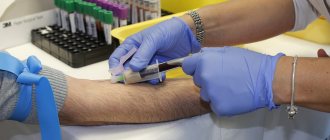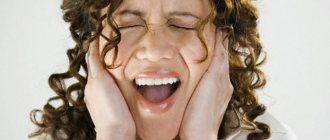Menopausal neurosis is a common problem faced by women of Balzac age. This is an unpleasant period in life, but, alas, inevitable. Changes occur not only at the hormonal level, but also at the mental level. They are observed in more than half of the patients. What to do about it? Let's find out in the article.
Features of neurosis during menopause
Climacteric neurosis is a state of a woman’s psyche in which changes of an autonomic nervous nature occur. To a greater extent, such transformations are associated with hormonal metamorphoses. Pathological changes occur during the functioning of the hypothalamic centers of the nervous system.
This is a rather serious disease that needs timely attention and treatment. In the early stages, this disease manifests itself mildly, but in its advanced form serious consequences are possible. Changes in the structure of a woman’s personality are not excluded.
The strongest fears influencing the appearance of neurotic reactions
Each age has its own fear, and if children are afraid of the “babyka” under the bed, then ladies approaching the menopause threshold begin to experience causeless anxiety for completely different reasons.
Outbursts of uncontrollable anger and hysterics
The condition can be characterized by the slogan “everything is bad.” And it doesn’t matter what exactly, everything is just not as it should be. In any situation, instead of constructive dialogue, conflict immediately grows. Understanding that constant quarrels can lead to losing acquaintances and friends, the lady is sometimes unable to change the situation. This is due to a hormonal storm, when a lack of estrogen, a violation of the delicate balance, jeopardizes the stability of existence, gives rise to anxiety, irritability, panic attacks that grow out of stress and hysterics.
There is little pleasant, but the condition can be corrected if you consciously take measures. It’s not just about the drugs, you’ll have to change your worldview, at least in small things, learn self-control, techniques for finding emotional calm through breathing exercises and mastering the practices of wushu or yoga.
Fear of loneliness
Menopause often exacerbates certain processes, and this also happens with emotions. Observing changes in appearance, well-being, feeling a loss of strength, an unmotivated fear of being alone appears. Even if there are loving families nearby, logic still gives way to the irrational feeling of approaching changes.
Read
Symptoms of dizziness during menopause
In such a situation, psychological help becomes very effective, especially from a family psychologist. It will help you realize that love and attention have not gone away and the origins lie in far-fetched reasons.
Feeling Useless
Stormy youth is gradually replaced by a more measured course of life. By the age of 40-45, it becomes stable, the number of new events and emotions decreases, it begins to seem that the routine is simply overwhelming and nothing depends on personal efforts. Against the backdrop of decreased activity and loss of strength, the picture is very plausible from a female point of view. This position destroys self-confidence; even a slight decrease in attention from loved ones becomes the basis for depression.
The style of behavior of a woman with a man during menopause can also change significantly. The gradual loss of attractiveness, changes in body weight, shape, creates the preconditions for certain neurotic reactions. It is worth adding to the list physiological changes, including increased dryness of the mucous membranes, discomfort during intimate contact, and fears of becoming pregnant, despite the almost complete cessation of ovarian function.
There is the emergence of total control and a desire to be constantly aware of the partner’s movements or complete indifference to loved ones, oneself, and the world around us.
Both conditions require outside help and it is problematic to cope with them on your own.
Negative factors
According to statistics, almost 60% of women who go through menopause experience menopausal neurosis. Previously, doctors associated the disease with a lack of hormones. However, modern medicine is reflected in age-related changes in the functioning of the hypothalamus.
The causes of neurosis during menopause lie in hormonal changes. These transformations affect the psychological state of a woman. Such changes intensify the symptoms of the pathological process.
External factors play an important role:
- hereditary predisposition;
- character traits of a person;
- stressful situations (past and present);
- weak immune system;
- overstrain of the body;
- wrong lifestyle;
- lack of useful elements in the body;
- chronic fatigue;
- systematic lack of sleep (sleep disturbance).
Menopausal neurosis can be caused by one or several causes. Only a doctor can determine the specific origin of the disease. He will be able to adequately assess the situation and prescribe the necessary therapy. Serious mental disorders or disorders of metabolic and vegetative-vascular processes may be hidden under seemingly harmless symptoms.
The impact of menopause on the female psyche
Typically, the mental state during menopause in women is unstable. This is influenced by the departure of children into independent lives, the appearance of young professionals at work who also strive to take a worthy position in the team, and the irrational fear of being left alone even in a prosperous family.
The attitude of a woman herself to a series of changes can be divided into 4 types.
- Indifferent . It is characterized by indifference to the environment and to oneself, including. In some women, the psyche during menopause takes a defensive position. Unable to cope with the flow of negative information, it turns off, like a burnt out light bulb. The condition is dangerous due to indifference and ignorance of accumulating problems. Against the background of such perception, it is easy to miss the symptoms of an incipient disease and miss the time for beneficial treatment.
- Adaptation . Translated from Greek, menopause is a ladder, a path upward, to the new and unknown. And what it will be depends only on the woman herself and her attitude to what is happening. The human psyche is very flexible and, if desired, adapts to changing circumstances. By observing how a woman behaves during menopause, one can accurately say whether she is mentally prepared for it. With a certain desire, adaptation occurs quite quickly, positive aspects are found in the new status, interesting opportunities open up, and a positive mood sets in.
- Actively overcoming symptoms is typical for purposeful women who are determined to achieve results and maintain their gained positions. They prepare in advance for a new chapter in life, react sensitively to the slightest changes, and immediately try to take adequate measures. Sometimes in the struggle for an ideal they can overdo it. The influence of menopause on their behavior is expressed quite clearly, but does not bring any special psychological problems.
- Neurotic forms of behavior during menopause can develop into full-fledged neuroses, especially among suspicious ladies who are carried away by internal experiences, focusing only on their problems and fenced off from the outside world with a veil of alienation. The situation is unfavorable for emotional balance and requires timely correction with complex drugs with a sedative effect.
Signs of neurosis during menopause
The described condition during menopause manifests itself clearly. Its main characteristic features:
In some cases, menopause and neurosis are not interrelated concepts. In some women, neurosis does not manifest itself during menopause. However, changes in behavior occur. The perception of the world around us is changing.
Choosing sedatives during menopause
Sharp changes in mood and depression among the fair sex are not always associated with a person’s difficult character. Often such phenomena are provoked by hormonal changes during menopause. Due to the fact that such conditions cause a lot of discomfort not only to the woman, but also to her loved ones, doctors prescribe sedatives for menopause.
Stress, depression, and nervous breakdowns are often observed during menopause.
When do you need sedative herbs?
There are a number of symptoms for which experts recommend treatment with sedative herbs. They are:
- Sudden mood swings.
- Excessive irritability.
- Aggression for no apparent reason.
- Depressive states.
- Fast fatiguability.
- Sleep problems.
- Decreased libido.
- Frequent migraine attacks.
- Tides.
- Paresthesia.
- Disturbances in the functioning of the cardiovascular system.
- Noise in ears.
- Problems in the digestive system.
In order to select suitable sedatives for menopause in women, you should be fully examined and identify the true causes of unpleasant symptoms.
What rules of application exist?
When treating hot flashes, sedatives for menopause can be purchased at the pharmacy or prepared yourself. In the latter case, it is very important to adhere to certain rules for harvesting and storing plants, collecting them only at a certain time.
Taking sedative decoctions is safe
Do not forget that before taking any decoction or infusion, it is recommended to obtain permission from a qualified specialist. Self-medication can be dangerous, as there is a risk of developing an allergic reaction.
How herbs are used in folk medicine
Nature is rich in a large number of healing herbs, which contain minerals and trace elements necessary for a woman’s body during menopause. Traditional medicine involves the use of medicinal plants in the form of decoctions, infusions, mixtures, or their use during baths and inhalations.
If you regularly use sedatives during menopause, women will notice an improvement in their condition. This treatment is available and affordable.
What herbal preparations are used
There are several basic herbs that are very popular during menopause. They are presented in more detail in the table.
| Sage | Normalizes the general condition, reduces the intensity of hot flashes, eliminates redness on the skin and increases the secretion of the genital organs. |
| Hawthorn | Eliminates fever, dizziness, normalizes blood pressure. |
| Oregano | Normalizes blood pressure, calms the nervous system, regulates the female cycle. |
| Maroon queen | Eliminates excessive sweat formation, relieves fever and removes irritability. |
| Red brush | Fights hot flashes, facilitates the menstrual cycle. |
All of these remedies cope well with the symptoms of menopause and ease its course.
Sage leaf has a calming effect
How to take herbs
To feel more comfortable, women prefer to take sedatives during menopause. To do this, it is recommended to study the rules for their preparation.
- Sage is usually used both internally and externally. Experts advise using herbal leaves daily for 60 days. After a month of taking them, hot flashes are reduced by 50%, and after two – by 80%.
When performing inhalations, a woman inhales medicinal vapors. The essential oils released from sage have a beneficial effect on the body.
Often women brew tea from this herb. Hot drinks eliminate hot flashes and excessive sweat production. To prepare tea, pour 2 tablespoons of the herb with 700 milliliters of boiling water, infuse it in a thermos or keep it in a steam bath.
In addition, the herb is often used during bathing from decoctions or infusions.
- Oregano is often used during menopause in the form of tea or infusion. To prepare tea, take 2 tablespoons of the herb, place it in a thermos, add a liter of boiling water and leave for 30 minutes. After this, the tea is drained and filtered using gauze. Take 100 milliliters 3 times a day before meals.
You can prepare a decoction of oregano
For the infusion, prepare 2 teaspoons of oregano and 200 milliliters of alcohol. The herb is poured with alcohol and infused for 7 days, shaking occasionally. After a week, filter the infusion and drink 30 drops before meals.
- Hawthorn can be used both in the form of berries and flowers. To prepare a medicinal infusion, you need to pour 3 tablespoons of the plant with 3 cups of boiling water and let it brew for 24 hours. In the morning, place the mixture on low heat and boil for about 7 minutes. Drink a glass 3 times a day before meals.
It is worth considering that the infusion cannot be stored for a long time; it is better to constantly take a fresh product.
- Burgundy uterus is most often used in the form of infusions. To do this, 300 grams of this plant are poured with 0.5 liters of vodka, left for 21 days and taken 30 drops for two weeks.
- The red brush effectively combats the symptoms of menopause.
To prepare the decoction, steam 1 teaspoon of herbs in 1 glass of boiling water and leave for about 3 hours. Then the broth is filtered and I drink it morning and evening for 3 months. Mistletoe also has very beneficial properties. - Mistletoe is a herb that tones the body well. A tablespoon of the plant is steamed with two glasses of boiling water, infused and filtered. Drink small doses all day.
Menopause triggers internal heat. If a woman drinks medicinal products, then these symptoms will not bother her.
When herbs are contraindicated
There are several situations in which sedatives during menopause in women are prohibited. They are as follows:
- Allergic reaction.
- The presence of irritability, increased heart rate, surges in blood pressure.
- Taking medications without proper examination of the body.
In this video you will find available sedatives:
The fact is that the absence of a menstrual cycle can indicate not only menopause, but also pregnancy, therefore, before taking herbs, you should consult a specialist. During menopause, sedative herbs will not only relieve unpleasant symptoms, but also ease overall well-being.
Source: https://mesyachnie.com/klimaks/uspokoitelnye-sredstva.html
Neurosis during menopause as a mental disorder
Neurosis during menopause may include one type of disorder or a combination of them. There are 4 types of such disorders:
- Asthenic appearance (memory deteriorates, fatigue occurs, performance decreases sharply).
- Depressive appearance (mood changes in a negative direction).
- Hypochondriacal appearance (obsessive anxiety, panic attacks during menopause, attributing unnecessary illnesses to oneself, excessive worry about one’s health).
- Hysterical appearance (instability in stressful situations, even with the slightest trouble, touchiness, capriciousness, tearfulness).
Therapeutic and preventive measures for neuropsychiatric disorders
The loss of self-control, the ability to manage one’s emotions, the emergence of neurotic reactions can be prevented and the harm they cause can be minimized. The basis for their occurrence is hormonal imbalance when the reproductive system stops functioning. Over time, the body will certainly adapt to new conditions, but for now there is an avalanche-like reaction. To maintain physical health and mental comfort, it is necessary to stabilize the processes by artificially replenishing the lack of hormones.
There are two options:
- complex plant-based preparations with phytohormones;
- prescription of hormone replacement therapy.
Both methods are quite effective. Differences in methods and composition of drugs.
Important! Phytohormonal preparations are produced on the basis of natural ingredients, act gently, and have almost no contraindications.
Non-hormonal preparations with phytoestrogens
Helps cope with:
- depressive symptoms;
- excessive excitability;
- cognitive impairment.
Additionally, they contain vitamin and mineral supplements that slow down the external manifestations of aging, increase immunity, and relieve chronic fatigue. Topical preparations such as ointments, gels, creams and suppositories restore mucous membranes and relieve symptoms of dryness and irritation. The disadvantages include the cumulative effect of treatment, which manifests itself 2-3 weeks after the start of use of the drug.
HRT
It is used in complex cases that require rapid relief of a dangerous condition. Recommended for those at risk of developing osteoporosis and Alzheimer's disease. Improvement in emotional state occurs already 2-3 days after the start of therapy. Has certain contraindications.
Worth considering! Hormonal medications are prescribed and discontinued only by a doctor to avoid relapses of the negative condition.
Short-term courses are carried out, taking about 1 month, and long-term therapy, which can take several years. It all depends on the condition of the body and indications.
If there is a threat of a pathological course of menopause, medical and psychological support is necessary.
Prevention
First of all, you need to realize the fact that nothing terrible happened, a new stage is beginning and you are given the opportunity to rise one step higher in your personal development. The children have already grown up, life experience has been gained and the fear of unwanted pregnancy has gone away, since the natural purpose of procreation has been fulfilled. You can devote time to yourself, take care of your health, learn something new, and increase your share of communication.
For preventive purposes, it is worth adding to this:
- increasing physical activity taking into account personal preferences and body capabilities;
- reviewing the diet in the direction of benefits and subtle taste nuances, especially since culinary preferences can change dramatically;
- find time for massage, aromatherapy, spiritual practices, relaxation techniques;
- take on a new business that requires attentiveness and perseverance.
Understanding and support from loved ones is very important. Knowing how to behave during menopause in women, they only need to show a little attention and tact, to show that they still need their wife, mother, and grandmother.
Maintaining hormonal balance and working to stabilize your emotional state will help you adapt to ongoing changes, understand the naturalness of their occurrence and find new goals in life.
Stages of development of neurosis during menopause
Climacteric neurosis during menopause develops gradually. Doctors distinguish three stages of its development:
The stability of metabolic processes is influenced by the hypothalamus, and during menopause, their disruption can cause such a serious disease as osteoporosis. Typically, in the third stage of the disease, the hypothalamus especially affects the emotional state of a woman. Neurosis and menopause, the symptoms, age and treatment of which will be discussed further, are the consequences of the work of the brain. Moreover, the changes are dictated by age.
Scientists are constantly arguing about how common neurotic disorders are among women suffering from menopause. Many endocrinologists, gynecologists, and psychotherapists have come to the same conclusion: neurosis during menopause appears in almost half of women.
How to choose a sedative to treat menopause?
Increased irritability sometimes pushes you to act rashly, and in a fit of anger you want to grab the first pill you come across in order to come to your senses and calm down. Such a rash decision is fraught with unpleasant consequences. Firstly, almost all sedatives have a cumulative effect, so relief will come within a few days. Only potent drugs that are sold by prescription and require the calculation of an exact dosage have a rapid effect. Buying a drug based on the advice of friends or random phrases in forums is at least imprudent and dangerous to health.
After the first signs of menopausal syndrome appear, it is necessary to undergo an examination that will show the general condition of the body, confirm the deficiency of sex hormones and identify individual characteristics, allergies or possible drug intolerance.
What is included in the examination?
To obtain a complete picture and develop a treatment plan for neuroses and comprehensive support for the body, the attending physician needs the following results:
- tests for sugar, clotting, hormone levels, cholesterol;
- Ultrasound;
- ECG;
- mammograms;
- examination by narrow specialists.
Based on this data, an individual card is filled out, which will remain an important document throughout the entire period of menopause. Based on it, a decision will be made on prescribing the necessary medications and carrying out symptomatic treatment of chronic and newly acquired diseases. When choosing drugs for the treatment of neuroses, side effects should also be taken into account.
Symptoms of menopausal neurosis
This disease manifests itself both at the physical and vegetative levels. Main symptoms:
Additional symptoms include:
A dangerous complication of menopausal neurosis manifests itself in the form of depression, apathy and self-isolation. The reason for this depressed internal state is that the woman feels “unfit” because her reproductive function has faded.
Depression, although treated with medication, is very weak. Often a woman who suffers from menopausal neurosis experiences suicidal tendencies. Mania, panic attacks and depression may alternate.
Changes in hormonal levels have consequences. Severe complications include cancer of the mammary glands and female genital organs, mastopathy, and osteoporosis.
The appearance of wrinkles is the main symptom of menopausal neurosis. Your weight, figure and posture may change.
Treatment: main features
Treatment is not just about taking medications. Every woman with such a problem must follow the general recommendations of the doctor.
Features of the treatment of menopausal neurosis:
- It is necessary to adjust your diet. Include vegetable, fermented milk and other various products containing calcium.
- Exclude from the diet: alcoholic and energy drinks, spices, strong tea or coffee. Please note that alcohol can cause hot flashes.
- Maintain a sleep and rest schedule. Patients with menopausal neurosis need to get a good night's sleep not only at the time of treatment, otherwise there will be no positive result.
- Walk more in the fresh air.
Doctors strongly recommend that women with neurosis engage in physical therapy and take massage courses.
Psychotherapy
This condition should only be treated comprehensively. You should not expect improvement from taking medications alone.
After all, menopausal neurosis is a serious psychological problem, so it is necessary to strictly follow the recommendations described above and, if necessary, seek help from a psychologist.
Psychotherapy will help solve problems, thereby quickly stabilizing the woman’s general condition even without taking antipsychotics with a wide spectrum of action.
Drug treatment
Treatment tactics depend on the severity of clinical signs. In addition, before prescribing the drug, the doctor must take into account the patient’s age and medical history.
The age period is almost always accompanied by unpleasant symptoms. Therefore, in addition to the main treatment, it is necessary to additionally restore and maintain hormonal levels.
To normalize hormonal levels, synthetic or homeopathic hormones are prescribed. As a rule, drugs are prescribed for this condition if a woman experiences panic attacks.
Low-dose drugs are used as treatment: estrogen, progesterone and androgen.
Klimonorm: a combined antimenopausal drug that contains gestagen and estrogen. The active components of the product help normalize the psychological and emotional state of a woman, thereby reducing the symptoms of neurosis. The drug has a wide list of contraindications, so it is dispensed from the pharmacy only with a prescription from a doctor.
If a woman exhibits pronounced signs, then Divigel is prescribed, which has a feminizing effect. The initial dosage is 1.0 g of gel, use once a day. If necessary, doctors prescribe the drug in cycles with a dosage of 1.5 g per day.
How does VSD manifest itself in menopausal neurosis?
During menopause, it is difficult to diagnose vegetative-vascular dystonia. Menopausal neurosis with vegetative-vascular disorders has similar symptoms. The main difference is that neurosis during menopause affects the level of sex hormones, and during VSD it affects the functioning of the autonomic system. It is more difficult if both diseases occur simultaneously in a woman’s body. In this case, the following symptoms occur:
Most often, the culprit of this condition is the psyche of patients. Because they set themselves up for constant negativity. In this case, the heart speeds up, blood pressure jumps and general malaise occurs. If you feel these symptoms, you should consult a doctor who specializes in psychotherapy for vegetative-vascular dystonia.
Causes of neuroses during menopause
Irritability is always fraught with unpleasant consequences, from losing friends to health problems. It is on the basis of nervousness that many somatic, vegetative-vascular disorders are formed, migraine attacks and insomnia begin. But as menopause approaches, these symptoms become significantly worse. The main cause is hormonal imbalance, to which the nervous system primarily reacts. A decrease in the concentration of sex hormones sharpens perception, and a small nuisance turns into a tragedy on a universal scale. With this approach, one should not be surprised that various neuroses develop in a short time.
In addition to hormonal imbalance, the appearance of neuroses can be directly or indirectly affected by:
- decreased production of melatonin, which affects the quality of sleep and leads to overwork of the body;
- ailments caused by menopausal syndrome aggravate psychological instability;
- perception of menopause as a great misfortune, which often leads to apathy, depression and is the reason for prescribing a course of antidepressants.
Important! Nervousness and irritability in women during menopause requires treatment; if you take action at the first signs, then you can get by with herbal preparations and folk remedies. Calming drugs for menopause relieve emotional stress, stabilizing mood, restoring the ability to constructive dialogue.
Treatment
With menopausal neurosis, symptoms and treatment are interrelated concepts. So, with a weak clinical picture, the signs of neurosis will go away on their own over time. There will be no mental consequences during menopause.
Serious treatment is needed for those women whose symptoms of neurosis significantly affect normal life activities, causing maladjustment in society.
Treatment must be comprehensive. The following basic principles should be adhered to:
In particularly difficult cases, the doctor prescribes medications that help restore hormonal levels.
Where does the treatment of the disease begin?
The nature of the treatment of climacteric neurosis depends on the severity of the disease. In the early stages, there is no point in resorting to potent drugs, but you should pay attention to:
- Correct diet. A diet based on plant, dairy products, vegetables, fruits. Avoid eating cholesterol-rich foods. Alcohol, an abundance of spices, strong coffee, and tea are completely excluded.
- Complete rest and sleep. If a woman does not get enough sleep, then treatment of neurosis will give almost no results. It is recommended to take short breaks throughout the day.
- Regular walks in the fresh air. Constant walks have a beneficial effect on your overall psychological state. A sanatorium-resort treatment wouldn't hurt either.
- Therapeutic exercise, massage. They have a beneficial effect not only on the mental state, but also on the physical indicators of the body.
As for drugs for the treatment of neurosis during menopause, they are selected strictly individually. Without a real need, there is no point in taking potent drugs that are more likely to harm than help.
Doctors are confident that in the early stages, neurosis can be defeated with the help of sedatives that stabilize the pulse, improve blood pressure, have a positive effect on sleep and reduce the frequency and severity of hot flashes.
Important! Drug therapy is possible only after consultation with the attending physician and under his strict supervision.
Restoring hormonal levels to combat neurosis
Neurosis during menopause, as mentioned above, may not be associated with changes in hormonal levels. But it cannot be denied that hot flashes and other unpleasant symptoms of menopause do not affect a woman’s psyche. Therefore, it makes sense to prescribe hormonal therapy.
Hormonal drugs are divided into two categories:
- synthetic (artificial),
- homeopathic (phytohormones have a milder effect).
Such therapy will not only improve hormonal levels, but also stabilize the woman’s psychological state.
The role of psychotherapy in the treatment of illness
Climacteric neurosis must be treated comprehensively. You cannot take only medications, hoping for a quick and painless improvement. The occurrence of neurosis may be based on serious psychological problems and traumas, which only a qualified psychologist can help overcome.
Psychotherapy, with the right approach and the patient’s honesty, can solve several problems at once. Surprisingly, sometimes psychologists manage to stabilize a woman’s condition even without prescribing serious antipsychotics and sedatives.
Regular visits to a psychologist during menopause are just as important as going to the gynecologist. After all, psychological health disorders very often provoke physiological diseases.
Drugs
To restore hormonal levels when fighting neurosis, hormonal drugs are prescribed. They are usually classified into two categories:
The drug “Klimadinon” is especially popular and in demand. This is a kind of sedative for menopause, which affects the vegetative system. However, this drug has a number of contraindications. You should not start taking it on your own. Only by doctor's prescription.
Sedatives for menopause in women: tablets and drugs for nerves
Often people only talk about the physical manifestations of menopause. Many people discuss hot flashes, fever, palpitations and other manifestations of the syndrome in women. However, few people think about the emotional state of a woman, which is extremely unstable at this time.
However, treatment for mental symptoms is no less advanced than for physical symptoms. Let's look at the most popular sedatives for menopause used by women.
Lerivon
Lerivon has been used by women with depression for a large number of years. It has been well studied. Lerivon relieves tension, removes fear and nervous excitement, and reduces anxiety.
The effect is cumulative and appears approximately two weeks after the start of the course. Available in tablets. The dose is prescribed by the doctor. Doesn't cause addiction. Side effects can only occur when taking alcohol at the same time.
The drug may reduce concentrations during use. You should not drive a car during treatment.
Contraindications include liver disease, hypersensitivity, heart attack, pregnancy, lactation, manic syndrome. This is one of the sedatives for menopause.
Novo-Passit
Novo-Passit is another fairly common remedy used by women. This is a herbal preparation, so you do not need to take it if you have any allergies.
Available as a solution, there are also tablets. Novo-Passit is able to even out hormonal levels.
It normalizes sleep, relieves anxiety, and restores normal heart rhythm. Also copes with neurological pain.
It also helps with osteoporosis or suspicion of it.
The dose is prescribed by the doctor. The solution can be added to tea.
Contraindications include individual intolerance to the components, pregnancy and lactation.
Phytosedan
Instructions for using Phytosedan.
Phytosedan is a herbal mixture that has a calming effect.
Contains motherwort, hop heads, peppermint, licorice and valerian.
It calms, helps with sleep disorders and arterial hypertension.
Decoctions are made from Phytosedan. Three tablespoons of the collection are poured into a glass of boiling water and heated in a water bath for 15 minutes. The chilled decoction is taken in a third of a glass half an hour before meals. The course lasts from two to four weeks.
May cause allergies.
Contraindications include individual intolerance. Sedatives for menopause are taken according to a doctor's prescription.
Afobazole
Afobazole is a drug that can also be used for emotional disturbances during menopause.
A calming drug for menopause is available in tablets.
Used for anxiety disorders, sleep disorders, premenstrual syndrome.
Contraindications include pregnancy, lactation and hypersensitivity.
Doctors prescribe it orally after meals. The course length is from two to four weeks.
Side effects include headache, but this is a rare symptom.
Estrovel
Estrovel is a dietary supplement that contains many useful substances. The drug consists of soy isoflavones, dioscorea extract, sacred chasteberry extract, indole-3-carbinol, boron, folic acid. Also contains vitamins E, B6, K1.
It reduces hot flashes, normalizes blood pressure, relieves headaches, relieves weakness, improves mood and libido.
Contraindications include individual intolerance, pregnancy and lactation.
Adults are prescribed a dose of one or two capsules per day with meals. The course lasts two months.
"Klimaktoplan"
This is another recommended remedy that will help you survive menopause. This is what the instructions for use say about Klimaktoplan. The price and reviews of the drug are more than acceptable. This homeopathic remedy includes substances that modulate the activity of estrogen.
Feedback states that thanks to this medicine, anxiety, restlessness, and panic attacks go away. This occurs due to the normalization of the autonomic functions of the central nervous system. In particular, the state of the endocrine and cardiovascular systems, as well as the hypothalamus, pituitary gland and adrenal glands, is stabilized.
The drug should not be taken if you are hypersensitive to the components; it is also prohibited during pregnancy and lactation. This is what is said about Klimaktoplan in the instructions for use. The price (reviews claim that the cost of the drug is quite reasonable) is 608 rubles. The tablets are dissolved three times a day, 1-2 pieces on an empty stomach.
If a woman accepts hormonal changes and comes to terms with them, then this is half the success of therapy. The main thing is to promptly resort to treatment of the first symptoms.
Proper nutrition, a healthy lifestyle, stable sleep and a positive attitude towards the world around us are components of the fight against menopausal neurosis.
How to reduce attacks of neurosis
To normalize the functioning of the nervous system during menopause, hormonal drugs and sedatives are prescribed, and, if necessary, antidepressants. Hormonal medications should absolutely not be taken independently. They are selected by a doctor based on the results of blood tests for hormones and a complete examination of the woman’s health.
It is important to know that hormone replacement therapy has a large list of contraindications. A woman may not be aware of the appearance of some pathology in her body or the development of a disease. Taking hormonal medications will provoke the progression of the disease. Only an experienced neurologist or psychotherapist can select antidepressants that can normalize the functioning of the central nervous system without causing harm. After all, it is necessary to take into account a large number of factors.
A doctor should also select a sedative for women during menopause. He will conduct a comprehensive diagnosis, taking into account the intensity of all existing symptoms and the presence of concomitant diseases. Based on the results of the examination, an effective drug, the correct dosage and treatment regimen will be prescribed.
How to prevent mental disorders during menopause?
Psychological problems during menopause
In a woman’s life, there are two important biological moments that influence an unstable state of mind: these are periods of puberty and the decline of childbearing function. The main causes of emotional and mental disorders in women of mature age are:
- loss of reproductive function;
- stressful situations;
- social problems;
- low self-esteem;
- lack of full-fledged sexual relations;
- dissatisfaction with life.
External changes, mainly associated with metabolic disorders, are also an important trauma for a woman’s psyche. These include decreased skin firmness and elasticity, the appearance of gray hair, wrinkles and excess weight, hair loss, etc.
Psychological disorders during menopause are characterized by asthenovegative syndromes, manifested in the form of:
- fatigue and decreased performance;
- sleep disorders;
- changes in appetite;
- absent-mindedness;
- headache;
- unstable mood;
- increased anxiety, irritability;
- decreased mental abilities;
- intolerance to bright light and loud sound;
- increased feelings of guilt and inferiority;
- thoughts about suicide.
Psychological disorders are directly related to the individual characteristics of each woman, and the onset of menopause only intensifies the manifestation of traits such as temper, sensitivity, and nervousness. This can lead to the use of alcohol and drugs, and subsequently to the appearance of psychosis during menopause.
How to prevent mental disorders during menopause?
During menopause, a woman must learn to control her emotions and behavior, for this it is necessary to record all neuropsychic symptoms, and then seek advice from a doctor. In such cases, many patients are prescribed drug treatment in the form of hormone replacement therapy or the use of herbal remedies containing phytoestrogens. Antidepressants and tranquilizers are not excluded. Reflexology, massage, and psychotherapy sessions help effectively.
You can prevent and reduce nervous and mental manifestations on your own. For this you need:
- fresh air and daily walks, preferably in the evening;
- soothing baths with essential oils and herbal infusions;
- restful, restful sleep;
- proper nutrition and exercise.
The efforts made to control your behavior and the desire to remain beautiful and loved will not be in vain and will save you from mental disorders.
Neuropsychiatric diseases
Some women during menopause develop nervous and mental illnesses.
This is facilitated by neuroendocrine changes characteristic of menopause. Nervous and mental illnesses can take various forms during the menopause - from mildly expressed neurotic conditions to severe psychoses. Women in the menopause often react to somatic pathological phenomena and mental trauma in a completely different way than at a young age. Ordinary stimuli do not cause adequate, but more often paradoxical and ultra-paradoxical reactions. This can be explained, presumably, by the fact that the reactivity of the cerebral cortex and subcortical formations changes, the mobility of nervous processes decreases, and cortical inhibition weakens. These changes make it difficult to form new conditioned reflexes, as well as reactions to a new state. In some women (often the weak type), these changes occur much earlier than menstruation stops, signaling the onset of age-related (menopausal) changes. Neurotic reactions and a psychotic state are especially pronounced in neurasthenic and psychopathic individuals, who were previously distinguished by irritability, nervousness, mild excitability and hypochondria.
The idea of menopause as “the moment of the body’s fading, its reverse development and the first step towards a sorrowful end” (P.I. Kovalevsky), causes in many women mood lability, a tendency to depression, anxious-fearful anxiety, anticipation of upcoming illnesses and suffering.
A. Neurotic disorders in menopause especially often occur in the following forms: The first phase is characterized mainly by pronounced vascular and autonomic disorders - “hot flashes” that occur spontaneously or due to severe experiences, anxiety, severe fatigue, and sweating, in some patients excessively expressed (“sweat flows like a stream”).
In the second form, diencephalic disorders (crises) are noted: bradycardia, hypotension, hypothermia, chills, cardiac crises, heart pain, paresthesia of the limbs, severe weakness, excretion of large amounts of urine with low specific gravity, headaches reminiscent of migraines.
The third form occurs according to the type of Meniere's syndrome with vestibular disorders. Patients experience dizziness and tinnitus, without pathological abnormalities in the middle ear.
The fourth form is characterized by disorders of a predominantly neurotic nature: tearfulness, irritability, severe fatigue, depression and insomnia.
B. Mental disorders of the menopausal period are very different in nature, especially in severity, from minor mental disorders to severe, chronic and recurrent psychoses.
According to A. S. Chistovich, Ya. P. Frumkin, I. Ya. Zavilyansky and others, pure forms of menopausal psychosis are rare; mental illnesses with certain syndromes developing against the background of menopause are more often observed. The development of mental disorders is often preceded by mental trauma, an infectious or viral disease, often menopausal uterine bleeding, which recurs for a long time and causes constant worry and fear of cancer.
The range of mental manifestations of menopause is extremely wide - from mild, quickly passing hysterical reactions to pronounced psychopathy. The most common forms of mental disorders are:
1. Menopausal depression with a predominance of an anxious-fearful state. In mild forms, patients in this group experience a depressed state, increased fatigue, memory impairment, weakened mental activity, etc. In severe cases, this condition is usually accompanied by sleep disturbance, motor agitation, refusal to eat, resistance to treatment, and the desire to harm oneself.
2. Menopausal neurasthenic conditions. Patients experience general weakness, fatigue during physical and mental work, drowsiness during the day, poor sleep at night, increased sensitivity to external irritations (loud sound, bright light, etc.). Often there is a bad mood and fearful and indecisive behavior.
3. Menopausal hysteria. In contrast to the usual hysterical reactions of young women, it is characterized not by fainting, convulsive seizures and autonomic disorders, but by the formation of hysterical symptom complexes, visual and auditory hallucinations, often of an erotic nature.
4. Manic forms of menopausal psychoses. They usually begin with hypochondriacal statements and anxious-depressed mood disorders. Patients begin to become delirious and misinterpret internal sensations and external impressions. Ideas are developing about the destruction and change of their body as a result of the harmful effects of surrounding people and objects. Patients feel that they are being affected by poisonous substances, that they are being killed by electric shock, hypnosis, etc.
5. Late form of epilepsy (described at the end of this chapter).
Differential diagnosis of menopausal mental disorders with arteriosclerotic, schizophrenic, circular and other mental diseases is extremely difficult. The clinical picture of such psychoses is very complex, representing an interweaving of cerebral, somatic and psychogenic symptoms. It is often impossible to establish the transition of a menopausal psychotic state to a psychotic state caused by the development of cerebral arteriosclerosis, schizophrenia and other diseases (Ya. P. Frumkin and I. Ya. Zavilyansky).
The study of metabolism in diseases has established that patients with involutional psychosis and menopausal neurosis have disturbances in the biochemical parameters of the blood and urine. There is a shift in acid-base balance and a decrease in oxidative processes; cholesterol levels are slightly elevated; in protein fractions - a decrease in albumin and an increase in globulins; diuresis is often impaired, and the presence of products of incomplete combustion of proteins is noted in the urine. Metabolic disorders in women suffering from mental disorders during menopause suggest that they have a violation of regulatory devices, possibly due to weakening of cortical activity (M. A. Burkovskaya and I. T. Milchenko; N. F. Tolkachevskaya and M. A. Wunder; N. I. Gerasimov, G. P. Shesternikova, etc.).
Treatment of women suffering from menopausal psychosis should be carried out jointly by psychiatrists and gynecologists.
In mild forms of psychosis, patients should be under the supervision of psychoneurological medical institutions, and in severe forms, hospitalization is indicated in appropriate medical institutions, where, along with modern active methods of treating mental illnesses, they should also be carried out. hormonal treatment. For asthenodepressive and hysterical reactions, small doses of caffeine and bromine are indicated, which regulate the strength and mobility of the main primary processes. Hormonal drugs, especially estrogens, should be prescribed with extreme caution, differentiated, taking into account the menopause phase. In the first phase, in the presence of hyperestrogenism, the use of corpus luteum hormones and androgens is indicated; in the second phase, in case of hypoestrogenism, estrogen preparations are indicated; in the third phase, the use of estrogens in combination with androgens is more justified.
How does menopause affect the psyche?
Every woman should understand that neurosis is conventionally divided into several types of psychological disorders.
- Vegetative system. With this type, insomnia is noted, the woman has problems concentrating, and the memory gradually worsens.
- Hysterical type of neurosis. In this case, stress resistance decreases, so it is very difficult for a woman to cope with even minor stress. Signs: moodiness, tendency to constant hysterics. Some women with a hysterical type of neurosis experience increased sensitivity.
- Hypochondriacal appearance. Doctors consider this type of neurosis to be the saddest. Women begin to independently look for symptoms and make diagnoses for themselves, sometimes resorting to radical methods of treatment.
In medical practice, a depressive type of neurosis is also noted. It is characterized by frequent mood swings, decreased performance, and apathy.











